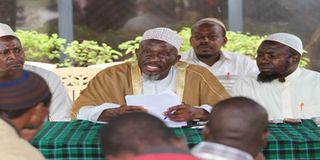Govt retreats again on Kadhi Court

The Council of Islamic Organisations in Tanzania spokesman, Sheikh Rajab Katimba, speaks during a press conference in Dar es Salaam yesterday. PHOTO | ANTHONY SIAME
What you need to know:
A member of the Constitution, Legal Affairs and Governance Committee, who requested for anonymity because he was not authorised to speak to the media, confirmed that they have already been briefed about the government’s decision.
Dodoma/Dar es Salaam. The government has reportedly withdrawn the controversial bill seeking to introduce the Kadhi Court.
A member of the Constitution, Legal Affairs and Governance Committee, who requested for anonymity because he was not authorised to speak to the media, confirmed that they have already been briefed about the government’s decision.
“The chairman called us for an impromptu meeting and told us that the government has decided to withdraw the bill,” said the source.
Information obtained by The Citizen established that the government withdrew the bill to pave the way for a consensus among opposing sides in the issue that has divided national opinion, mainly along religious lines.
The bill may be tabled in the next Parliament sitting next month, according to a source within the National Assembly.
The move comes two days after Prime Minister Mizengo Pinda met with religious leaders in Dar es Salaam on Tuesday.
Meanwhile, some Muslims addressed the media and declared that they would boycott the referendum on the Proposed Constitution in April over the failure by the government to include Kadhi courts in the supreme law.
The press conference was addressed by 11 Islamic organisations that announced they would stick to their stance over government’s failure to amend the bill.
Sheikh Rajab Katimba, the deputy secretary of the Council of Islamic Organisations, said that the bill sought to establish a Kadhi court that would have no legal powers, contrary to Islamic law.
He cautioned religious leaders and government officials against issuing statements that were meant to mislead Muslims.
He said the bill has several weaknesses that needed to be addressed and that the Muslim community had already proposed some changes, which had not been taken into consideration.
He said it was wrong to believe that Bakwata was the main organisation that represented all Muslims in the country, adding that many had lost trust in the body.
“Our views were meant to bring a strong bill that would help establish a foundation on which the court would operate,” he said.
He added that they were surprised to see various religious leaders commenting on the Kadhi Court, saying their aim was to mislead Tanzanians on the matter.
Sheikh Hassan Abbas said they had realised that the government’s decision to table the bill was meant to “cheaply” gain votes from Muslims in the forthcoming elections.
“In 2005 the Kadhi Court issue was in the ruling party’s manifesto, but after elections nothing tangible was seen until now,” he said.
During the meeting with the Christian clergy, Mr Pinda was accompanied by Attorney General George Masaju, Constitutional and Legal Affairs minister Asha-Rose Migiro and Dar es Salaam Regional Commissioner Said Meck Sadick.
The bill is contained in the written laws (Miscellaneous Amendments) Bill number 2, which seeks to amend 14 laws including the Islamic Law (Restatement) Act, (Cap 375).
Speaking to reporters in Dodoma last week, Mr Masaju defended the bill noting that government had critically analysed its decision to amend the law and established that it would not affect any group or individual Tanzanian.




